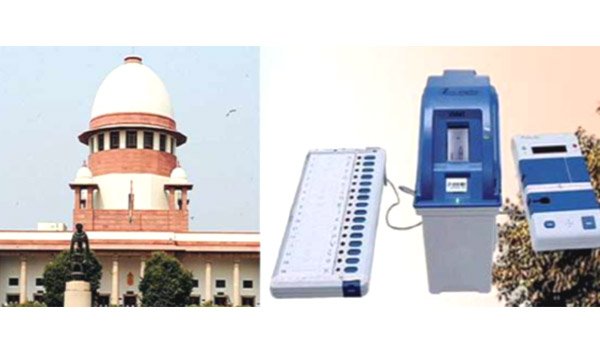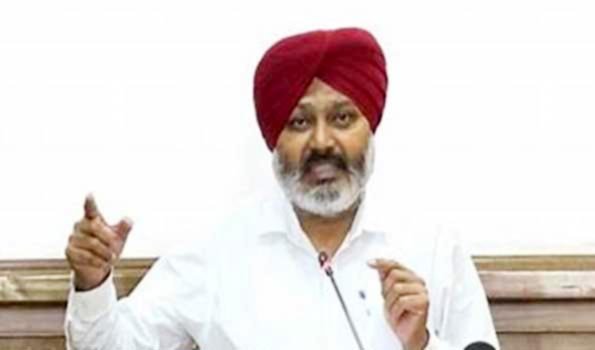New Delhi, Apr 18 (UNI) The Supreme Court on Thursday asked the Election Commission of India (ECI) to look into the allegations made by Advocate Prashant Bhushan that during a mock poll in Kerala, extra votes were recorded in favour of the BJP in the Electronic Voting Machines (EVMs).
A bench comprising Justice Sanjiv Khanna and Justice Dipankar Datta while hearing the EVM-VVPAT case for the second day today orally told Senior Advocate Maninder Singh appearing for the Election Commission to check up on the allegations made by Prashant Bhushan.
Advocate Prashant Bhushan, appearing for the Association for Democratic Reforms, cited a report published by Manorama Online Portal about the complaints raised regarding the mock poll conducted on the EVMs in the Kasargod constituency in Kerala.
As per the report, both the Left Democratic Front (LDF) and the United Democratic Front (UDF) gave complaints to the District Collector that at least four electronic voting machines (EVM) erroneously registered extra votes in favour of the BJP.
The Bench said that ‘there has to be sanctity to the electoral process and let nobody have apprehension that something which is expected is not being done’.
The Court was hearing a batch of petitions seeking a thorough count of Voter Verifiable Paper Audit Trail (VVPAT) slips in elections.
Three petitions were filed urging the Apex Court that while using the EVMs there should also be VVPAT slips alongside in the 2024 elections.
One of the petitioners also prayed that each EVM vote be tallied against VVPAT slips.
The plea filed by the Association for Democratic Reforms (ADR) said that VVPAT slips must be tallied with votes cast through EVMs so that citizens can confirm that their vote has been ‘counted as recorded’ and ‘recorded as cast.’
On the last hearing (April 16) Advocate Prashant Bhushan, appearing for ADR, told the Court that either the polling process should return to ballot paper instead of EVMs or all VVPAT slips should be counted and tallied with the votes shown by EVMs.
The Court had turned down Advocate Prasahant Bhushan’s suggestion to go back to election via ballot paper instead of EVMs citing how the Booth capturing took place during the days of polling by ballot paper.
During the hearing today, Senior Advocate Maninder Singh presented a chart showing the interaction between three machines-control unit, VVPAT and ballot unit.
The working of the machine was demonstrated before the court.
When CU gives the command to VVPAT, a Beep Sound will come, the official demonstrating the machine said.
Justice Khanna asked, “In a polling booth if you find 8 votes cast within a minute, will that not raise an eyebrow?”
To this the official replied that it would not happen, every vote takes 15 seconds and every press of a button is time-stamped.
Justice Khanna asked whether the machine also records the time when it is voted and the time is printed on the VVPAT slip.
The official replied in the negative citing that the secrecy might be compromised.
Justice Datta asked, ‘Is it possible for voters to get a copy of the slip? What’s the possible harm you can visualize’?
Justice Khanna further asked, ‘why it takes 1 hour for 1 VVPAT. Can’t machines be used for counting’?
‘The Official replied Paper is thin and sticky. It isn’t meant for counting. It is done serially under direct observation of the Returning officer and observer’.
During the last hearing, the court had ruled out the use of the Ballot paper voting procedure and had sought suggestions from all the stakeholders to avert the problems arising out of human interventions.
The Top Court had said that ‘the system should not be doubted. Human intervention in the polling and counting process could lead to further problems and biases.
The machine normally without human intervention will give you accurate results,” the court said.
The Court agreed that the problem arises when there is human intervention or when someone makes unauthorised changes to the software or machine. “If you have any suggestion to avert this, then you can give us that,” the Court said.
The Apex Court had also asked the Election Commission of India (ECI) whether ‘there is any punishment for officials and authorities manipulating Electronic Voting Machines (EVMs)’.
The bench had also said that ‘unless there is fear of stringent law and punishment, there is always a possibility of manipulation’.
The hearing will continue on Friday.











